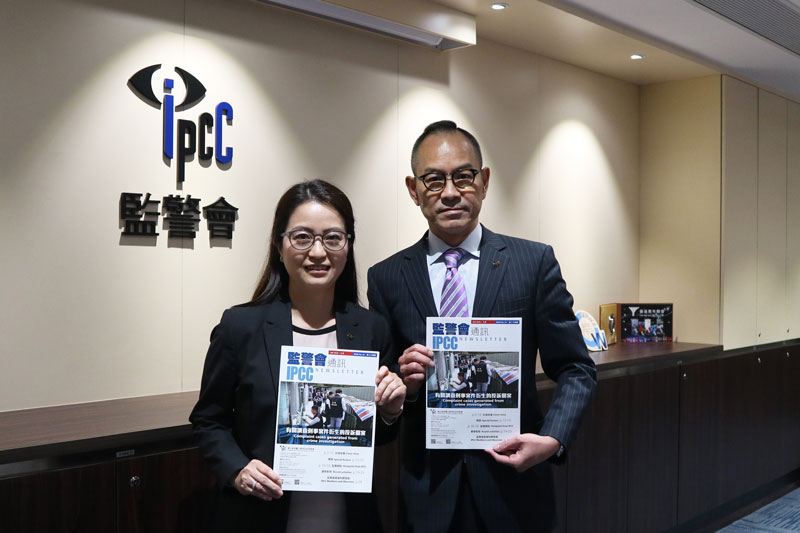Complaints against Hong Kong’s police received by an official watchdog hit a 12-year low in 2020/21, a trend which officials attributed to better-educated and better-behaved officers rather than a lack of faith in the watchdog’s independence.

The total number of reportable complaints received by the Independent Police Complaints Council (IPCC) from April 2020 to March this year was 1,363, the fewest since the council became a statutory body in 2009 when it received 3,686 complaints in a year.
The new figure also marked a 7.8 per cent decrease from 1,478 in 2019/20, when police behaviour was in the spotlight during months of pro-democracy protests and unrest.
Chairperson Priscilla Wong said she believed the fall in complaints was due to recommendations by the IPCC, improvements by the force and better-educated police officers. “Average police constables are also university graduates,” she told a press conference on Monday.
Daniel Mui, secretary-general of the IPCC, said the drop in complaints “necessarily means” an improvement in police performance.
In 2020/21, 87 officers were found to be at fault of whom seven underwent disciplinary reviews and 80 received warnings or advice. In 2019/20 two officers received a disciplinary review and 78 got warnings or advice.

No officer was criminally charged in the two years due to complaints endorsed by the IPCC.
The IPCC is tasked with reviewing the work of the Complaints Against Police Office (CAPO), an internal unit of the police force. The IPCC only has the power to scrutinise complaints classified as “reportable complaints” by the CAPO. The rest are categorised as “notifiable complaints” outside the purview of the IPCC.
The IPCC reports directly to Hong Kong’s chief executive and has faced criticism for lacking independence and the power to launch its own investigations or to summon people. Its 999-page report on the citywide 2019 pro-democracy protests largely cleared the force of wrongdoing.
In November 2020, the Court of First Instance ruled that the current police complaints system was “inadequate” and the government must fulfil an obligation under Article 3 of the Bill of Rights to maintain an effective mechanism. The government is appealing the ruling.
Complainants not coming forward
The police watchdog highlighted the high number of cases which could not be pursued because complainants refused to attend interviews or provide further assistance.

When a reporter asked if this was because the IPCC was seen as biased in favour of police, Wong said the watchdog does not favour any one side. “We are independent, fair and impartial.”
Wong said the difficulty it faced was complainants not turning up for interviews, not leaving contact information or even giving no name at all in many cases. She urged those who file complaints to state their contact information and complaints clearly.
“Lodging a complaint is a very serious matter,” former chair Anthony Neoh wrote in this year’s IPCC report. “[Complainant] also has the responsibility to provide complete and accurate information as well as valid contact method so that the two-tier police complaints system can function effectively…”

Neoh also warned complainants not to provide “false or misleading information,” saying they may be prosecuted. He cited the case of a complainant who claimed he was beaten in a police station but was later prosecuted for making a false report.
‘Satisfied’ with police progress
In its report into the 2019 unrest, the watchdog made 52 recommendations on police procedures and practices. The council said on Monday that 39 of them had been implemented – such as the introduction of a pre-set recording to notify callers of the 999 emergency line when a major incident occurs. Calls will then be re-directed to other precincts.
The improved system was a response to complaints that the emergency hotline was over-run on the night of the 2019 Yuen Long MTR mob attacks on protesters and others.
The remaining recommendations were mainly related to the use of force, such as instructions on when or how to deploy tear gas or pepper sprays, according to Mui.

The council revealed that 11 more allegations against the police relating to the 2019 protests and unrest had been substantiated. This brings the total number of complaints deemed to be justified to 26, out of 123 which were said to have been thoroughly investigated.
As of November 24 this year, CAPO said there were a total of 618 reportable complaints in relation to the protests, while 1,331 complaints were deemed not necessary to report to the IPCC.
Mui, the IPCC secretary-general, said all 11 newly substantiated allegations were minor allegations and officers involved had received verbal advice.
Such cases included one on November 17, 2019, when a police sergeant ordered members of the press to leave without displaying his “operation call sign.” Another case also involved failure to display operational call signs.
Support HKFP | Policies & Ethics | Error/typo? | Contact Us | Newsletter | Transparency & Annual Report | Apps
Help safeguard press freedom & keep HKFP free for all readers by supporting our team

LATEST FROM HKFP
HKFP has an impartial stance, transparent funding, and balanced coverage guided by an Ethics Code and Corrections Policy.
Support press freedom & help us surpass 1,000 monthly Patrons: 100% independent, governed by an ethics code & not-for-profit.










